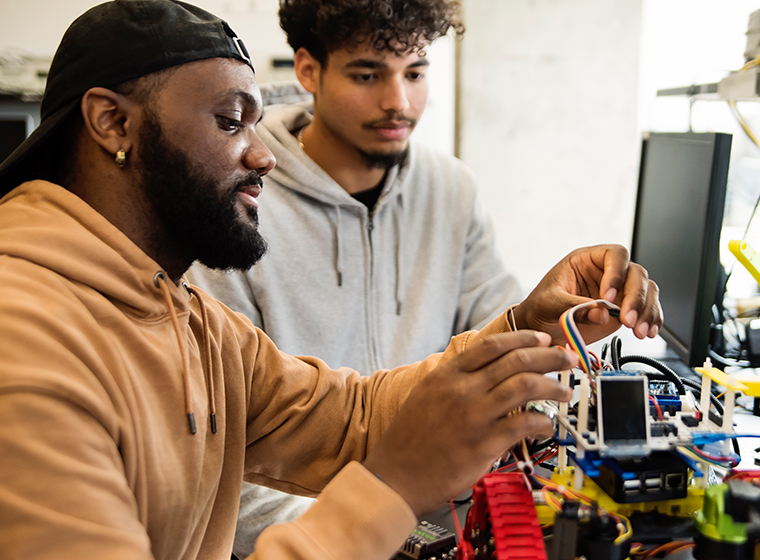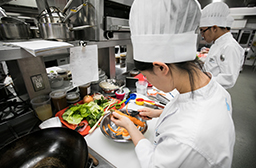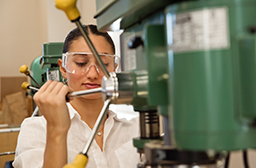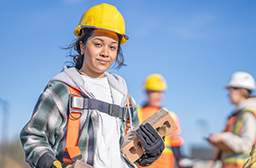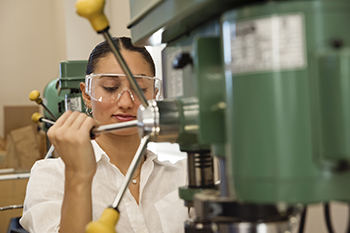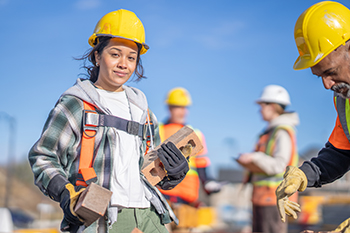A career in the skilled trades
Ontario schools have programs that help students explore in-demand careers in the skilled trades.
With specialty training, hands-on work experience and the ability to earn while you learn, skilled trades programs give students exposure to a wide range of secure, high-paying and satisfying careers.
There are more than 140 skilled trades in Ontario that provide a wide range of career opportunities, such as:
- automotive service technician
- carpenter
- crane operator
- welder
- hairstylist
- developmental services worker
Learn how you can get a head start in high school.
Get a head start in high school
Students can get an early start and strong foundational skills in the skilled trades through different programs in high school:
Ontario Youth Apprenticeship Program
The Ontario Youth Apprenticeship Program (OYAP) is a school-to-work program. It lets students explore and work in apprenticeships starting in the summer before Grade 11 through cooperative education (co-op).
Students can become registered apprentices and work towards becoming certified in a skilled trade, while completing their high school diploma.
Focused Apprenticeship Skills Training (FAST) stream
The FAST stream of OYAP is for students who want to complete the maximum apprenticeship training before they graduate high school. Students who complete OYAP-FAST get a seal on their Ontario Secondary School Diploma (OSSD) that shows their enhanced skilled trades learning when they graduate.
Eligibility
Students must:
- take at least 8, and up to 11 co-op credits
- get a registered training agreement before they finish their 8th co-op credit
For more information about OYAP and OYAP-FAST contact the:
- OYAP recruiter at your school board
- co-op education or guidance department at your local high school
Specialist High Skills Majors
The Specialist High Skills Major (SHSM) is an innovative program that lets high school students in Grades 11 and 12 focus on a career path that matches their skills and interests while earning their Ontario Secondary School Diploma.
Students can:
- concentrate their learning around a particular sector
- gain important skills on the job with actual employers, at skills training centres and at school
- earn industry certifications
Specialist High Skills Major programs are available in 19 sectors including:
- agriculture
- aviation/aerospace
- construction
- energy
- environment
- food processing
- forestry
- horticulture and landscaping
- hospitality and tourism
- information and communications technology
- manufacturing
- mining
- transportation
Browse the SHSM programs available at your local high school and school board and talk to your school’s guidance or cooperative education department or the SHSM coordinator at your school board.
Cooperative education (Co-op)
Cooperative education allows high school students to earn credits while completing a work placement in their community along with classroom learning.
Co-op allow students to:
- get hands-on learning
- test-drive career options
- see the relevance of their classroom learning
- earn credits through workplace experience
- develop skills and habits required in the workplace
- build a resumé for their postsecondary plans and future employment
All Ontario school boards with high schools offer co-op.
Dual credit programs
Dual credit programs allow students in high school to take college courses or apprenticeship training that count towards their Ontario Secondary School Diploma and a postsecondary certificate, diploma, degree or a Certificate of Apprenticeship. Dual credit programs are targeted at students facing challenges in achievement to help them graduate from high school and move on to college and apprenticeship programs.
Students can:
- earn high school credits while studying at a publicly funded college or taking apprenticeship training
- gain experience to transition to postsecondary education, including apprenticeship
- get a head start on learning and training for their future careers
Talk to your high school’s guidance counsellor to see if dual credit programs are offered at your school.
Search for dual credit programs at your local publicly funded college.
Skilled trades in the classroom
In high school, students learn about the skilled trades through a variety of courses.
Technological Education graduation requirement
Students starting high school in September 2024 must earn a Grade 9 or 10 Technological Education credit to graduate.
These credit courses now have mandatory learning on the skilled trades and include:
- Technology and the Skilled Trades – Grade 9
- Technology and the Skilled Trades – Grade 10
- Grade 9 and 10 broad-based technology focus courses
Earning a credit in any of these courses will meet the new graduation requirement.
This introduces high school students to Technological Education and skilled trades earlier, as they make decisions about:
- apprenticeships
- senior level courses
- career paths
- college or university
Learn more about technological education course descriptions and prerequisites.
Career studies
The updated mandatory Grade 10 career studies course:
- focuses more on education and career/life planning and career pathways into the skilled trades
- builds on mental health learning and financial literacy
Teachers may offer a look at careers in high-growth industries focused on science, technology, engineering and math (STEM).
Learning about skilled trades earlier
We are increasing skilled trades awareness and exposure in schools so it gives younger students more opportunities to develop interests and skills that can lead to careers in the skilled trades.
Education and career/life planning
Education and career/life planning helps students from kindergarten to Grade 12:
- learn more about themselves and their opportunities, including those in skilled trades professions
- make decisions and set goals
- achieve their goals and make transitions
With support from their teachers, guidance counsellors and parents, students develop the knowledge and skills they need to:
- make informed choices for their education, career and life outside of school
- plan their next steps after high school
Learning opportunities
Students across all grades can learn beyond the classroom and explore different career options, while building their skills to prepare for the jobs of tomorrow, through other learning opportunities, such as:
- career fairs
- classroom visits/career talks from skilled tradespeople
- job shadowing
- one on one career mentorship
- project-based learning
- workplace tours
- skills and STEM competitions
Working with partners
We work with school boards and their partners to deliver hands-on STEM and skilled trades experiential learning opportunities in elementary and high schools.
FIRST Robotics Canada
FIRST Robotics Canada is a registered charity that inspires students to pursue further studies and careers in science, technology and engineering. They also work to support integrating more girls and young women into STEM courses and careers.
Students can build robots and take part in tournaments with competitions, judged awards and other forms of recognition, potentially including university and college scholarships.
Competitions start as early as elementary school and continue through high school. Learn more about the competitions.
Skills Ontario
Skills Ontario provides a broad range of programming and skills competitions that:
- help students to explore, consider and prepare for careers in the skilled trades and technologies
- connect students with employers from skilled trades industries
Programming options include:
- career awareness workshops
- Far North trades and tech days
- in-school presentations
- summer camp
Skills Ontario also has events and programs for:
- young women in Grades 7 to 12 to develop skills and find a mentor, such as career exploration events and a young women’s conference
- First Nations, Métis and Inuit youth to get information and resources about skilled trades and technology, develop skills and find a mentor, such as:
- a conference for Indigenous youth
- workshops
- mentoring events
- Skilled Trades and Technology Days
- summer camps
